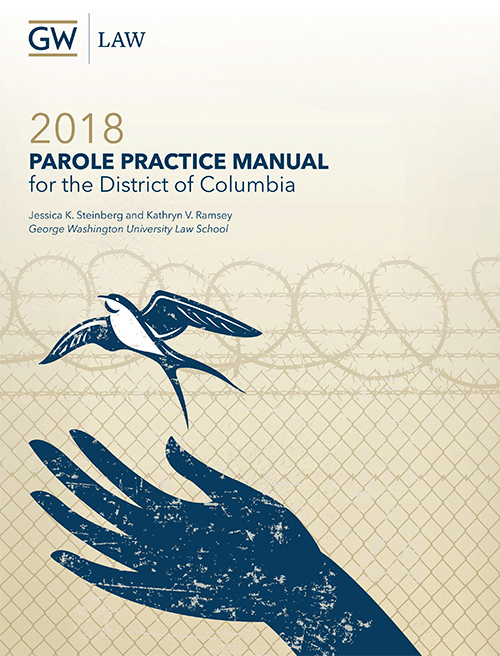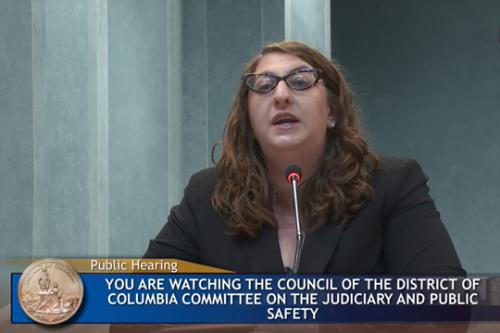Jessica Steinberg
Parole Practice Manual for the District of Columbia (2018)
Authored by Professors Jessica Steinberg and Katy Ramsey, the Parole Practice Manual for the District of Columbia is the only comprehensive primer on parole practice for DC residents. The manual is intended to assist incarcerated individuals in securing their freedom and is available to download for free in the link below. Questions regarding the Manual should be directed to Jessica Steinberg, Professor of Law.
The Prisoner & Reentry Clinic represents prisoners and individuals facing legal barriers as a result of their criminal records. The clinic’s cases sit at the intersection of the civil and criminal justice systems and tackle issues related to mass incarceration, prisoner reentry, and the collateral consequences of criminal convictions. This is an intensive litigation clinic in which students, under faculty supervision, handle their cases from start to finish. Students can expect to handle cases in state and federal administrative tribunals or in DC Superior Court. Representative casework includes representing a client in a parole matter or seeking to expunge a client’s criminal record. Students may also participate in policy advocacy before the DC Council or with organizational clients on prisoner and reentry issues.
Through this clinic, students develop a wide array of skills, including interviewing and counseling clients, problem-solving, collaboration, developing factual and legal theories, case planning, witness preparation, negotiating with opposing parties, oral and written advocacy, and system analysis and reform. The classroom component of the clinic focuses on skills development as well as structural issues related to the intersection of poverty, race, and the civil and criminal justice systems. The clinic is open to all second and third year students with no prerequisite courses.
In the News
Prisoner & Reentry Clinic Fellow Elenore Wade Testifies in Support of Changes to the District's Criminal Record Sealing Law
Elenore Wade, Friedman Fellow and Visiting Associate Professor in the Prisoner & Reentry Clinic, testified before the DC Council’s Committee on the Judiciary and Public Safety on April 8, 2021, in support of expansive changes to the District’s criminal record sealing law and increasing access to justice in the area of record sealing. At the hearing, two modest criminal record sealing bills were under consideration, and the Committee opened discussion on a more recently introduced bill that would drastically expand and simplify criminal record sealing in DC The District’s current criminal record sealing law is one of the most restrictive in the U.S. and provides little meaningful relief to the one in seven people in DC with a criminal record, most of whom are Black, who continue to face discrimination based on their criminal records long after they serve their sentences. Professor Wade spoke to the importance of reducing financial and procedural access to justice barriers for individuals seeking criminal record sealing under any new law. Watch the testimony
Prisoner & Reentry Clinic Student Reema Ghabra, 3L, Testifies at DC Council Meeting about the Mayor's Office on Returning Citizens Affairs
On February 19, 2021, Prisoner & Reentry Clinic (PARC) student Reema Ghabra, Class of 2021, testified at a DC Council committee hearing regarding the performance of the Mayor's Office on Returning Citizens Affairs (MORCA). MORCA is a DC agency tasked with assisting people who need services when they return home from jail and prison. Over the past several weeks, PARC’s students have been working closely with clinic clients who have recently been granted compassionate release from prison. Students like Ms. Ghabra check in with recently released clients daily to support them in their reentry to the community after decades in prison, and our class has seen the obstacles returning citizens face in obtaining identification, public benefits, and healthcare. Ms. Ghabra’s testimony brought the Council's attention to the difficulties PARC’s clients have when trying to access reentry services through MORCA and highlighted how the DC government can assist with the unique difficulties older adults and people with serious health issues experience upon release. Combining direct representation with policy advocacy allows PARC students to amplify individual clients’ stories while also seeking broader change in the community. Watch the testimony
Prisoner & Reentry Clinic Fellow Maya Dimant Testifies in Support of Occupational Licensing Bill on Behalf of Returning Citizens
Maya Dimant, Friedman Fellow and Visiting Associate Professor in the Prisoner & Reentry Clinic, testified before the DC Council on January 26, 2020 in support of a law to lift barriers to occupational licensing for citizens returning home from prison. To demonstrate the importance of this bill, Professor Dimant shared the story of Mr. H, a clinic client, who is about to be released on parole after 25 years in prison. Mr. H earned parole at his first hearing, with community volunteers naming him a model prisoner, a "brilliant writer" and an "incredible role model." Extraordinarily, based on training he pursued while incarcerated, Mr. H was able to secure employment as a plumbing apprentice upon his return to the community. But to turn his apprenticeship into a profession, Mr. H has to obtain a plumbing license from the District of Columbia government, which can refuse to grant one based on his felony record. Professor Dimant spoke to the significance of granting hardworking returning citizens access to professional licenses so they can achieve economic opportunity and the dignity of self-sufficiency. Watch Professor Dimant's testimony
Time Served: Prisoner & Reentry Clinic Student Alexandra North Testifies in Support of Prisoner Sentence Reduction
On March 26, 2019, 2L and Prisoner and Reentry Clinic (PARC) student Alexandra North testified at a hearing of the DC Council to advocate in favor of the "Second Look Amendment Act of 2019," which would allow rehabilitated prisoners to seek a sentence reduction in court. In recognition of emerging brain science about the risk-taking behavior of young adults, the proposed legislation would allow people sentenced to lengthy prison terms when they were under 25 years old to petition a court for early release. Ms. North's testimony focused on a PARC client who would have the opportunity to request a judicial review of his sentence under the proposed law. He was sentenced to 47 years to life in prison when he was only 20 years old and has since demonstrated extraordinary rehabilitation during his nearly three decades of incarceration. Alongside direct client representation, this policy advocacy allows PARC students a holistic view of the post-conviction landscape for DC residents navigating the criminal justice system. Watch Ms. North's testimony.
"Sick, Elderly Prisoners Are At Risk for COVID-19. A New DC Law Makes It Easier for Them to Seek Early Release"
December 30, 2020
Jessica K. Steinberg is quoted in the Washington Post about how COVID-19 sparked compassionate release programs for prisoners.
Presidential Clemency for a Clinic Client
GW's Prisoner & Reentry Clinic won clemency for two clients, Rudolph Norris and Fred Glover, from President Barack Obama as part of the Obama Administration's historic clemency initiative to end harsh prison terms for low-level drug offenders.
Student-attorneys Courtney Francik, JD '15 and Bart Sheard, JD '15, worked tirelessly on Mr. Norris' case with support from Professor Jessica Steinberg and Friedman Fellow Mira Edmonds. The New York Times profiled their work and published an opinion on the matter from Professor Steinberg.
Mr. Glover's clemency grant was the product of outstanding and dedicated work on the part of student-attorneys Katie Mello, JD '16 and Steve Magnusson, JD '16. GW Law covered their work in depth.
Photo from left to right: Katie Mello, JD '16; Jessica Steinberg; and Steve Magnusson, JD '16







